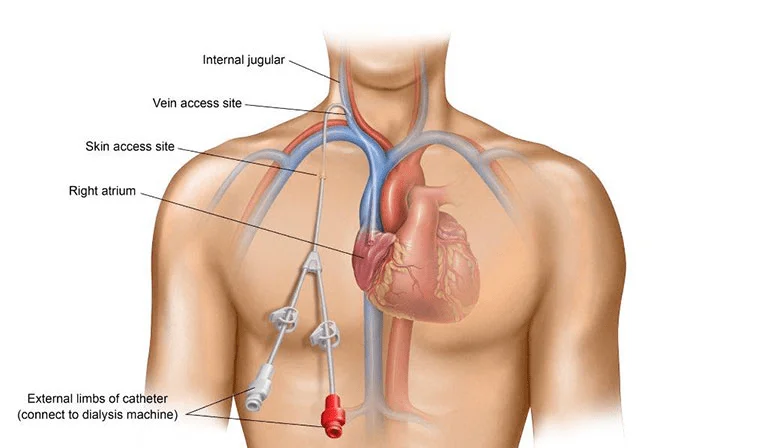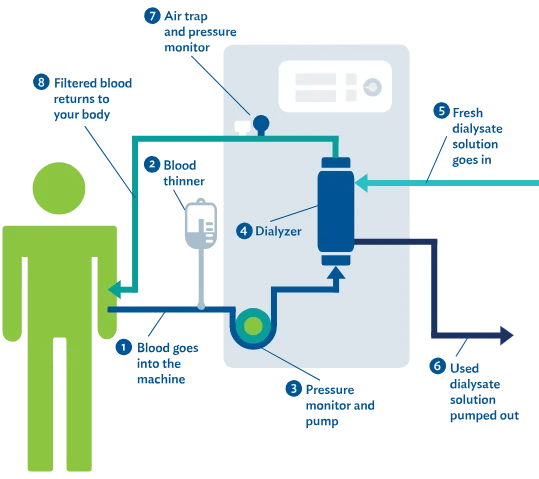Acute Hemodialysis
in Aurangabad
Fast and Effective Treatment: Explore Acute Renal Failure Hemodialysis in Aurangabad
Our kidneys sometimes stop functioning suddenly for various reasons, leading to Acute Kidney Injury (AKI). In such critical situations, a faster treatment method called acute renal failure hemodialysis can be used.
If you’re facing acute renal failure in Aurangabad, Bavikar Kidney Hospital is here to help. We offer prompt diagnosis and treatment options, including acute renal failure hemodialysis in Aurangabad, to address your condition and support your recovery.
In situations where your kidneys suddenly lose their ability to filter waste, acute renal hemodialysis becomes a vital and time-sensitive treatment. It acts as a life-saving measure by cleansing your blood and preventing complications. At Bavikar Kidney Hospital, our team of experienced nephrologists and dialysis specialists is dedicated to providing you with high-quality care during this critical time.
What Causes Acute Renal/Kidney Failure?
Acute kidney failure (AKF), also known as acute renal failure, is a sudden and rapid decline in kidney function. Unlike chronic kidney disease (CKD), where function deteriorates gradually over time, AKF can develop within hours or days. Here’s a breakdown of the leading causes of acute kidney failure:
Reduced Blood Flow to the Kidneys
Decreased Blood Volume
This can be caused by severe dehydration, blood loss (hemorrhage), or extensive burns.
Heart Problems
A weakened heart (heart failure) or a sudden drop in blood pressure (shock) can reduce blood flow to the kidneys.
Severe Blood Vessel Narrowing
Blockages or narrowing of the arteries supplying blood to the kidneys can restrict blood flow and impair kidney function.
Direct Damage to the Kidneys
Toxins and Medications
Certain medications, toxins (like heavy metals), or severe allergic reactions can damage the kidneys directly.
Infections
Severe bloodstream infections or urinary tract infections can damage the kidneys.
Autoimmune Diseases
In some autoimmune diseases, the body’s immune system mistakenly attacks healthy kidney tissue.
Kidney Stones
Blockage of the urinary tract by kidney stones can cause urine backup and damage the kidneys.
Blockage of Urine Flow:
Enlarged Prostate
In men, an enlarged prostate gland can obstruct the urethra and prevent urine from flowing out of the body.
Blood Clots
Blood clots in the urinary tract can block urine flow and lead to AKI.
Tumors
Tumors in the urinary tract can impede urine flow and damage the kidneys.
Additional Factors:
Major Surgery
Extensive surgeries can sometimes lead to AKI, especially if there are complications like blood loss or dehydration.
Certain Medical Conditions
Severe medical conditions like uncontrolled diabetes or high blood pressure can increase the risk of AKI.
Is Acute Renal Failure Hemodialys in Aurangabad (HD) Right for You?
Take this short quiz to explore if in-center hemodialysis might be a suitable dialysis option for you!
Lifestyle
- I am comfortable with a regular schedule of clinic visits for dialysis treatment (typically 3-5 times per week).
- I have reliable transportation to and from dialysis appointments.
- I don't mind adhering to a specific treatment schedule that may disrupt my daily routine.
Preferences:
- I prefer having a healthcare professional manage my dialysis treatment during each session.
- I am comfortable with needles and accessing my bloodstream for dialysis.
Next Steps:
- If you checked most of the boxes above, hemodialysis might be a good option to discuss with your nephrologist.
- Remember, this quiz is a starting point, and a comprehensive evaluation by your doctor is crucial for determining the best dialysis approach for you.
Note: This is not a diagnostic tool and should not replace a consultation with a healthcare professional.
What Are The Symptoms/Signs of Acute Kidney Failure?
Acute kidney failure (AKF) can develop rapidly, sometimes within hours or days. While some people with mild AKF may not experience any symptoms, here are some warning signs to be aware of:
Changes in Urination
- Decreased urine output: You may urinate less frequently, and the amount of urine may be significantly less.
- Bloody urine: Blood in the urine can be a sign of various problems, including AKI.
- Foamy urine: Excessive foam in the urine can sometimes indicate protein in the urine, which can be a sign of kidney problems.
Fluid Retention
As the kidneys struggle to remove excess fluids, you may experience swelling (edema) in your ankles, feet, hands, or face.
Unexplained Fatigue and Weakness
Waste products building up in the blood due to AKI can lead to fatigue and tiredness.
Nausea and Vomiting
Loss of appetite, nausea, and vomiting occur as the body struggles to eliminate toxins.
Confusion
In severe cases of AKI, confusion, disorientation, and difficulty concentrating may develop due to waste product buildup affecting the brain.
Shortness of Breath
Fluid buildup in the lungs (pulmonary edema) can sometimes occur with AKI, leading to difficulty breathing.
Seizures or Coma
In very severe and untreated cases of AKI, seizures or coma may develop.
It’s crucial to seek immediate medical attention if you experience any of these symptoms, especially if they develop suddenly. Early diagnosis and treatment of AKI are essential to improve the chances of recovering kidney function.
If you’re in Aurangabad and experiencing symptoms suggestive of AKI, Bavikar Kidney Hospital can provide prompt evaluation and treatment options, including acute hemodialysis if necessary.
How Is Acute Renal Failure Hemodialysis In Aurangabad Performed?
Acute renal failure (ARF), also known as acute kidney injury, is a sudden and serious decline in kidney function. Acute hemodialysis becomes a vital treatment option when the kidneys fail to effectively remove waste products and excess fluids from the blood. At Bavikar Kidney Hospital in Aurangabad, our team of experienced nephrologists and dialysis specialists is dedicated to providing exceptional care throughout the acute hemodialysis process.
Here’s an elaborate breakdown of the steps involved in acute hemodialysis for AKI:
Preparation (Before Treatment):
Consultation and Evaluation
Your doctor will conduct a thorough evaluation to assess your overall health condition and the severity of AKI and determine if acute hemodialysis is the most suitable treatment. Blood, urine, and imaging studies might be performed to gather the necessary information.
Vascular Access
A vascular access point is needed for efficient blood removal and return during hemodialysis. In some cases of acute hemodialysis, a temporary central venous catheter might be placed in a large vein in your chest (see image below). This procedure is generally performed by an interventional radiologist using ultrasound guidance.

The Hemodialysis Procedure:

Blood Withdrawal
Once your vascular access is established, a sterile needle is inserted into the access point to withdraw a specific amount of blood.
Filtration
The withdrawn blood travels through a thin tube into a dialyzer machine. A semipermeable membrane separates the blood from a dialysate solution inside the dialyzer. Waste products and excess fluids pass through this membrane into the dialysate, while essential blood components like red blood cells remain in the bloodstream.
Blood Return
The cleaned blood is then returned to your body through another needle in your vascular access point.
Monitoring and Post-Treatment:
Vital Sign Monitoring
Throughout the hemodialysis session, your blood pressure, heart rate, and other vital signs will be closely monitored by our experienced nurses to ensure your safety and well-being.
Post-Treatment Recovery
Following the hemodialysis session, you will be monitored briefly to ensure you feel well before being discharged home or to your hospital room.
Frequency and Duration:
The frequency and duration of your acute hemodialysis sessions depend on the severity of AKI and your body’s response to treatment. In some cases, only a single session might be needed, while others may require multiple sessions over several days or weeks until your kidney function improves.
Acute Hemodialysis at Bavikar Kidney Hospital:
At Bavikar Kidney Hospital, we understand the critical nature of AKI and the importance of prompt and effective treatment. Our team is committed to providing you with compassionate care and high-quality acute hemodialysis services to support your recovery journey.

Experienced Nephrologists and Dialysis Specialists
Our team consists of highly qualified nephrologists and dialysis specialists with extensive experience in managing AKI and performing acute hemodialysis procedures.

Advanced Technology
We utilize state-of-the-art dialysis equipment and monitoring systems to ensure optimal treatment effectiveness and patient safety.

Comfortable Treatment Environment
Our dialysis unit is designed to provide a comfortable and relaxing environment for your treatment sessions.

Holistic Care Approach
We go beyond just the hemodialysis procedure. Our team works collaboratively to address your overall well-being, including dietary counseling and emotional support.
If you are experiencing symptoms suggestive of AKI in Aurangabad, don’t hesitate to seek immediate medical attention. Early diagnosis and treatment can lead to better outcomes. Bavikar Kidney Hospital is here to provide you with the care and support you need during this challenging time.

